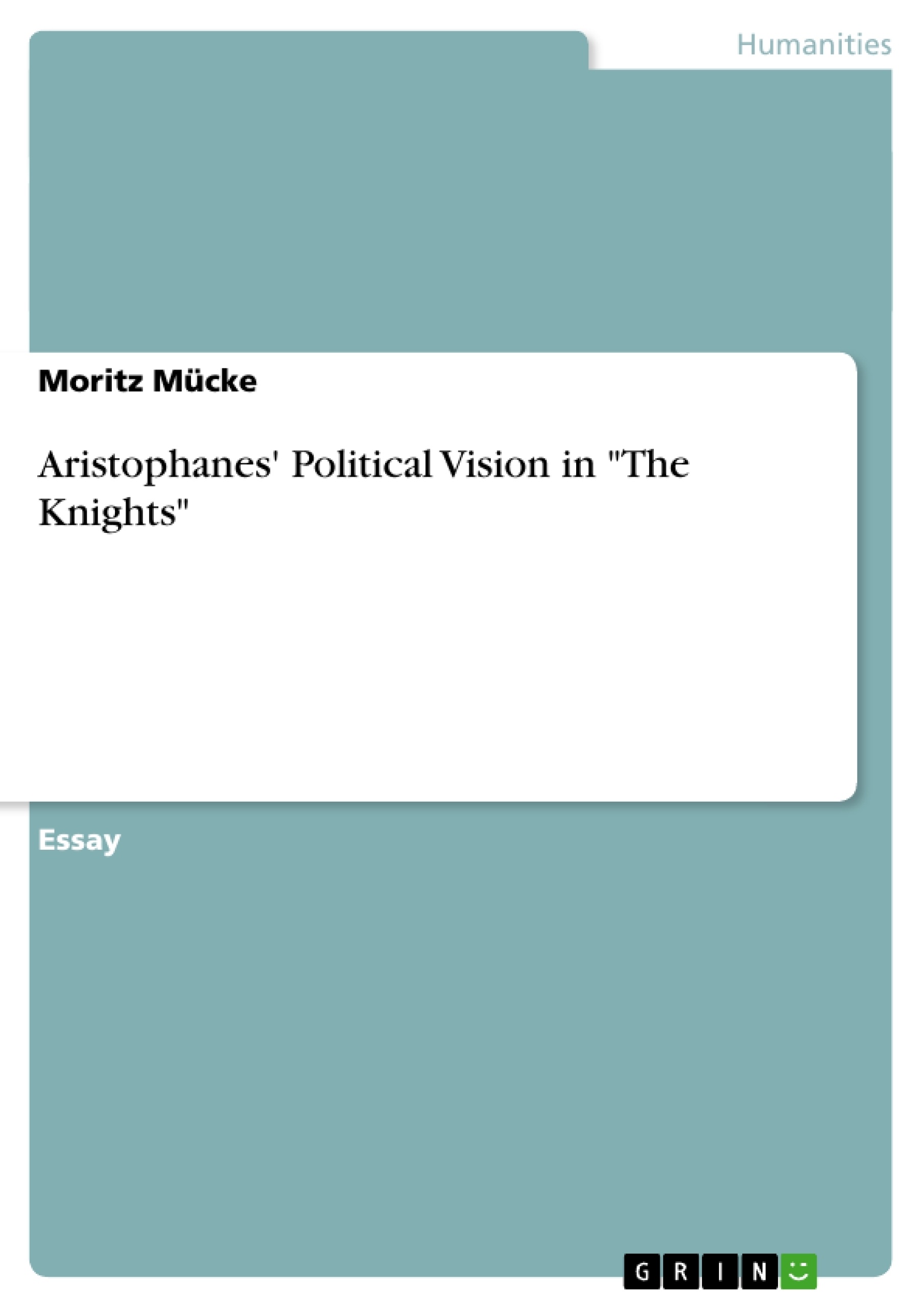In The Knights Aristophanes mocks his adversary Cleon and comments on the phenomenon of demagoguery in democratic Athens. The play, first produced in 424 B.C., entrusts a sausage-seller to rival the Paphlagonian, a thinly veiled Cleon, in flattering and gaining the approval of the demos.1 A thorough examination of the comedy serves to demonstrate that Aristophanes attacks not democracy itself but unscrupulous demagogues like Cleon and Hyperbolus as well as the tendency of the Athenian demos to intellectual laziness, which allows the practitioners of flattery to bribe the people with their own money.
Table of Contents
- Aristophanes' Political Vision in The Knights
Objectives and Key Themes
The main objective of this text is to analyze Aristophanes' political vision as presented in his play, The Knights. The text examines how Aristophanes uses comedy to critique demagoguery in democratic Athens, focusing on his portrayal of Cleon.
- Aristophanes' portrayal of Cleon as a demagogue.
- The critique of Athenian democracy's susceptibility to flattery and intellectual laziness.
- The role of the Athenian demos (the people) in political decision-making.
- Aristophanes' proposed ideal of a balanced democracy incorporating aristocratic prudence.
- The personal conflict between Aristophanes and Cleon.
Chapter Summaries
Aristophanes' Political Vision in The Knights: This text analyzes Aristophanes' play, The Knights, focusing on its political commentary. It examines the satirical portrayal of Cleon, a powerful demagogue, and how his actions are criticized. The text discusses Cleon's manipulation of the Athenian demos through flattery and bribery, highlighting the intellectual laziness of the demos which allowed this manipulation to occur. The play's depiction of Cleon is shown as exceptionally relevant to contemporary Athenian society due to Aristophanes’ personal conflict with Cleon and his previous legal troubles. The text further examines how the play's success was tied not only to its commentary on contemporary Athenian politics but also to the personal grievances between the playwright and Cleon. The play’s ending where the Demos is “boiled young again” suggests Aristophanes’ belief that the flaws in Athenian democracy lie not in the system itself, but in the people's susceptibility to demagoguery and poor judgement. Aristophanes' vision is presented not as a rejection of democracy but rather a plea for a more prudent and discerning populace, capable of resisting the influence of unscrupulous leaders like Cleon. The text concludes by arguing that Aristophanes advocated for a democracy guided by aristocratic principles, striking a balance between democratic participation and the wisdom of elite leadership, a perspective reflecting the views of a segment of Athenian society dissatisfied with the trajectory of their democracy.
Keywords
Aristophanes, The Knights, Cleon, Athenian democracy, demagoguery, flattery, intellectual laziness, Demos, political satire, oligarchy, aristocratic prudence.
Aristophanes' Political Vision in *The Knights*: Frequently Asked Questions
What is the main objective of this text?
The main objective is to analyze Aristophanes' political vision as depicted in his play, The Knights. It examines how he uses comedy to critique demagoguery in democratic Athens, focusing on his portrayal of Cleon.
What are the key themes explored in the text?
Key themes include Aristophanes' portrayal of Cleon as a demagogue; the critique of Athenian democracy's susceptibility to flattery and intellectual laziness; the role of the Athenian demos (the people) in political decision-making; Aristophanes' proposed ideal of a balanced democracy incorporating aristocratic prudence; and the personal conflict between Aristophanes and Cleon.
How does Aristophanes portray Cleon in *The Knights*?
Aristophanes satirically portrays Cleon as a manipulative demagogue who uses flattery and bribery to control the Athenian demos. The portrayal highlights the demos' intellectual laziness, which allows Cleon's manipulation to succeed. The personal conflict between Aristophanes and Cleon significantly influences this portrayal.
What is Aristophanes' critique of Athenian democracy?
Aristophanes critiques the Athenian democracy's susceptibility to demagoguery and the intellectual laziness of the demos. He doesn't reject democracy entirely but argues for a more discerning populace capable of resisting unscrupulous leaders.
What is Aristophanes' proposed ideal of democracy?
Aristophanes advocates for a balanced democracy combining democratic participation with the wisdom of elite leadership – a system incorporating aristocratic prudence. This reflects the views of a segment of Athenian society dissatisfied with the trajectory of their democracy.
What is the significance of the play's ending, where the Demos is "boiled young again"?
The ending suggests that Aristophanes believed the flaws in Athenian democracy stemmed not from the system itself, but from the people's susceptibility to demagoguery and poor judgment.
What role did the personal conflict between Aristophanes and Cleon play in *The Knights*?
The personal conflict significantly influenced the play's content and its success. The play's commentary on contemporary Athenian politics is intertwined with Aristophanes' personal grievances against Cleon.
What are the key words associated with this analysis of *The Knights*?
Key words include Aristophanes, The Knights, Cleon, Athenian democracy, demagoguery, flattery, intellectual laziness, Demos, political satire, oligarchy, and aristocratic prudence.
- Quote paper
- Moritz Mücke (Author), 2014, Aristophanes' Political Vision in "The Knights", Munich, GRIN Verlag, https://www.grin.com/document/286184




